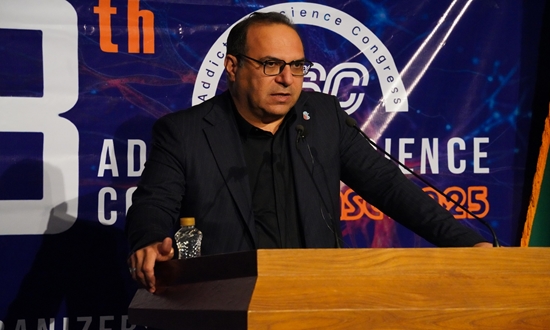Insights from Dr. Nader Tavakoli at Congress on Addiction Science
A Comprehensive and Evidence-Based Approach to Addressing Addiction

Dr. Nader Tavakoli, President of the Iran University of Medical Sciences (IUMS), has emphasized the urgent need for a comprehensive and scientific approach to mitigate the harms associated with addiction, particularly in light of the rising prevalence of drug use among young people, especially women. Speaking at the 18th Congress on Addiction Science, being held on September 2-5, 2025 at Razi Conference Center, IUMS, he articulated that addressing the addiction crisis necessitates a "health-oriented, community-oriented, and evidence-based" strategy.
According to the public relations department of the Iran University of Medical Sciences, Dr. Tavakoli highlighted the World Health Organization's recognition of addiction as one of four critical global challenges, alongside the proliferation of weapons of mass destruction, environmental degradation, and socio-economic disparities. He noted that, within Iran, addiction ranks fourth in the classification of disease burden, following road traffic accidents, other injuries, cardiovascular diseases, and depression. Official statistics indicate that approximately 2.8 million individuals are directly affected by addiction; this number escalates to an estimated 10 to 12 million when considering family members and dependents.
Dr. Tavakoli pointed out the alarming trend of increasing drug use among younger demographics, particularly women. He stated, "Addiction is the leading cause of hospitalization in intensive care units across medical facilities. When we include substances such as hookah and alcohol, the scale of the issue becomes significantly more severe." He further remarked on the extensive social ramifications of addiction, which impose both direct and indirect costs on society. These include treatment expenses, diminished productivity within organizations, strain on judicial and law enforcement systems, and a substantial burden on families, communities, and future generations.
He reiterated a critical perspective on addiction, asserting that it should not be viewed as a crime but rather as a chronic and treatable disease. To facilitate this understanding, the "Addiction Knowledge Think Tank" has been established at the Iran University of Medical Sciences, aimed at fostering planning and discourse around addiction as a health-oriented issue across various dimensions.
Dr. Tavakoli also discussed innovative global strategies for treating and reducing the harms associated with addiction. He noted that many developed nations, along with the World Health Organization and the United Nations Office on Drugs and Crime (UNODC), are advocating for solutions based on "health-centered, community-centered, and evidence-based" methodologies. Key elements of this approach include integrated treatment models, the establishment of harm reduction centers, community-focused interventions, individual health education, mental health considerations in treatment, and the incorporation of technological and innovative therapies.
He concluded by stressing the necessity for a coordinated plan within the Ministry of Health to reform medical facilities and collaborate effectively to combat the illicit distribution of drugs through informal networks.


comment